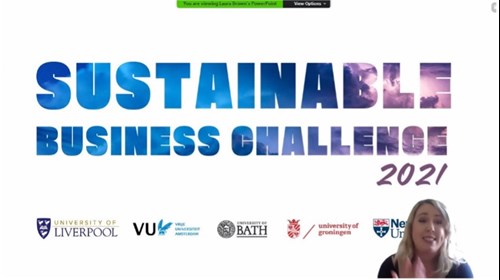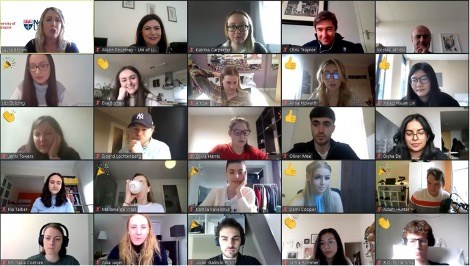Group Size
?
1.) Small group (teams of 4-6)
2.) Individual Task
3.) Large Group
4.) Any
Small group (teams of 4-6)
Learning Environment
?
1.) Lecture Theatre
2.) Presentation Space
3.) Carousel Tables (small working group)
4.) Any
5.) Outside
6.) Special
Any
QAA Enterprise Theme(s)
?
1.) Creativity and Innovation
2.) Opportunity recognition, creation and evaluation
3.) Decision making supported by critical analysis and judgement
4.) Implementation of ideas through leadership and management
5.) Reflection and Action
6.) Interpersonal Skills
7.) Communication and Strategy
1Creativity and Innovation
2Opportunity recognition‚ creation and evaluation
3Decision making supported by critical analysis and judgement
4Implementation of ideas through leadership and management
5Reflection and Action
6Interpersonal Skills
7Communication and Strategy
0Digital and Data Skills
Students worked in small cross-disciplinary and institutional groups to respond to the following provocation:
“Develop an idea to build a selected UK industry back greener and more sustainable in the wake of the changes brought about by COVID-19 – choose from: education, transport, trade and healthcare as an industry”.
To start with, students were introduced to the design thinking framework to help them in approaching the challenge provocation.
After students had selected their chosen industry from the four options, students explored potential problems within their chosen industry and explored the UN’s SDGs. For example, one student group looked at the education sector and SDG number 5: Gender Inequality.
In their groups, students were supported in ideating creative and innovative solutions using divergent and convergent thinking exercises.
To develop their idea, they conducted market research, used the Business Model Canvas, and met with business advisers across a wide range of industries.
The Challenge culminated in the teams designing and recording digital pitches. Shortlisted teams delivered a live elevator pitch to the whole cohort and panel of judges, who picked the overall winning team.
Activity:
Prior to the Challenge:
All 123 students across the 5 institutions were grouped into 23 teams of 4-5. The teams were deliberately diverse, taking into account stage, discipline, gender, nationality and institution. They were given background materials on The Civil Service (the external partner), the UN’s SDGs and responsible innovation. Students were added to an MS Teams Space which housed all asynchronous teaching materials (which were uploaded as and when relevant throughout the programme), communications and reminders.
They were also added to their private group channel to meet their teams and were encouraged to get to know one another before the programme started, which most teams embraced. Each team was also allocated an adviser. An adviser from each institution (myself included), were allocated to approximately 5 teams throughout the programme, who could offer subject, pastoral, and logistical support.
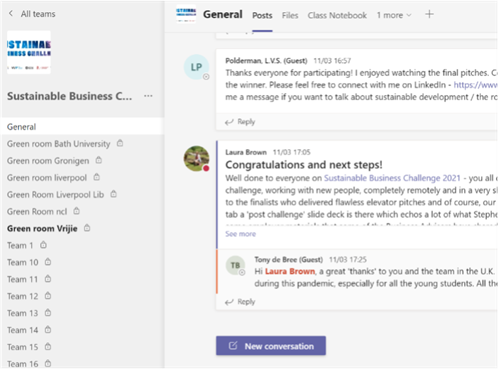
Challenge overview:
The challenge itself ran from Monday 8th March - Thursday 11th March 2021. I decided to expand the delivery over a few days so the experience would still be challenging and fast-paced but ensured that students did not suffer from screen-fatigue. I also wanted to ensure that cross-institution group working would be viable, giving them enough space to balance and manage diaries amongst teaching and time differences.
The programme was designed to be mostly done at the student’s own pace, with some scaffolded experiences and milestones throughout.
There were:
1x live grand finale session at the end of the programme
Session 1 – Challenge launch:
The Challenge began using Zoom for a live session, which covered:
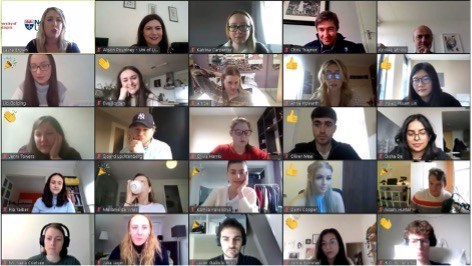
The session was delivered using a mix of slides, breakout rooms, polls, emoji reactions, chat with each activity undertaken at a relatively fast pace. The session had a mix of activities to appeal to a wide range of learning and personality styles.
The activities presented here helped students develop Enterprise themes 1. Creativity and Innovation, 2. Opportunity recognition, creation, and evaluation, 3. Decision making supported by critical analysis and judgement, 6. Interpersonal Skills, 7. Communication and Strategy Skill and 8. Digital and Data Skills.
Asynchronous materials:
Students were then invited to access the now published asynchronous materials on MS Teams at their own pace – which included:
The materials here encompassed individual and group activities, as well as short and snappy bespoke video content, external resources, and text. Students worked together and individually through these over the next two days.
The activities presented here helped students develop Enterprise themes 3. Decision making supported by critical analysis and judgement, 4. Implementation of ideas through leadership and management, 5. Reflection and Action, 6. Interpersonal Skills, 7. Communication and Strategy Skill and 8. Digital and Data Skills.
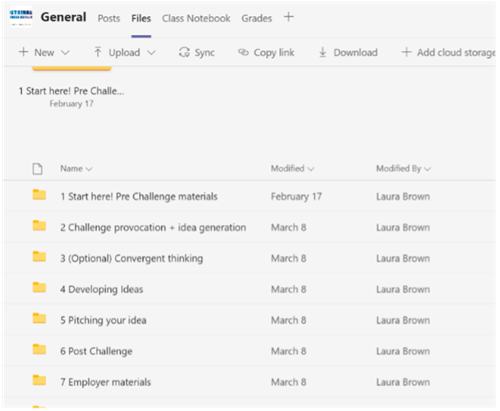
Business adviser meetings:
Student teams were also invited to research and book 3x business adviser meetings for Tuesday 9th using Google Sheets. Business advisers were sourced from a variety of industries and from a mix of large businesses and SMES from the UK and the Netherlands. Students had to pick 3x meetings across 3 categories: 1x larger corporate companies, and 2x smaller companies.
During these meetings, the teams would present their initial idea, some potentially using the Business Model Canvas, and have questions prepared following the MOM test principles. The Business adviser would provide feedback and guidance on their ideas.
This activity helped students develop Enterprise themes 4. Implementation of ideas through leadership and management, 5. Reflection and Action, 6. Interpersonal Skills, 7. Communication and Strategy Skill and 8. Digital and Data Skills.
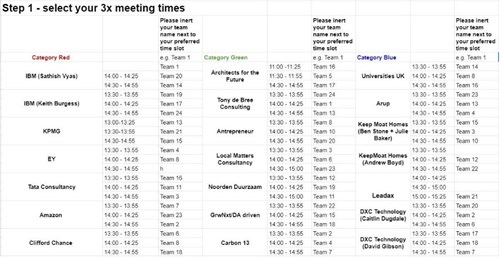
Digital pitch deadline:
By Wednesday midnight, each student group submitted their digital pitch; a pre-recorded, 5-minute pitch summarising the problem identified and their idea. Students were given guidance on different digital formats and pitching skills through the above asynchronous materials and through their adviser’s support.
These were judged by the Business advisers on the Thursday morning. Each stream selected a winner by using a bespoke judging criterion, which looked at:
Six finalists were put forward to the live grand finale.
Creating a digital pitch helped students develop Enterprise themes 1. Creativity and Innovation, 7. Communication and Strategy Skill and 8. Digital and Data Skills.
Session 2: Grand Finale:
The challenge culminated in the grand finale on the Thursday with a live session on Zoom. Students were not made aware in advance who had made the shortlist in advance of the session to ensure attendance was high. Within the session, the shortlisted finalists were announced, and students delivered a short live elevator pitch to the whole cohort, and the judging panel consisting of senior members of the Civil Service. Judges then proceeded to ask questions to uncover more detail on the shortlisted teams’ ideas. Whilst the judging panel went to a breakout room for final deliberations, students were encouraged to reflect on their experience and were given links to employability via a representative from ISE. The overall winners and prizes were announced at the end of the session.
For the students who delivered an elevator pitch, this activity helped students develop Enterprise themes 6. Interpersonal Skills and 7. Communication and Strategy Skill.
All other students would have developed Enterprise theme 5. Reflection and Action through the reflection and employability section.
Post-Challenge:
All students were required to give evaluative feedback by completing a bespoke survey which gathered both qualitative and quantitative data. The evaluation asked about the experience itself as well as personal evaluation on their own personal and skills development. Students were required to submit their survey in exchange for a participation certificate.
By completing this exercise, students developed Enterprise theme 5. Reflection and Action.
Using the wide range of online tools and different online platforms throughout the challenge also helped students develop Enterprise theme 8. digital and data skills.
Learner feedback:
Learner feedback was overwhelmingly positive, giving good feedback on the experience and giving insight into their own personal development:
"I really enjoyed the Sustainable Business Challenge 2021. I developed lifelong friends from multiple universities across the 4 days. I found it valuable speaking to business advisors from Amazon and Carbon 13 which helped to enhance my commercial awareness. I developed the ability to be innovative, critically think and work in a fast-paced environment. The challenge pushed me out of my comfort zone by engaging in public speaking when pitching our idea to the panel. This developed my confidence, and it is an invaluable experience that I can speak about in my future job applications and interviews. I recommend it to all motivated students who are willing to challenge themselves to make a more sustainable future."
“(Please keep) Providing such beautiful experiences to students who are looking forward to exploring new paths”
Personal and skills development:
Students from a WP background also highlighted:
“Thank you for giving students like me the opportunity to take part in such a challenge”
There was also an appreciation that the challenge was able to run given the circumstances brought on by COVID-19:
“I am very grateful that you still chose to pursue the challenge even with Covid”
Client feedback:
Feedback from the partner employer, the Civil Service and from business advisers was also positive:
“The SBC21 was well organized and nice to see that these kinds of initiatives can continue in this corona time! Great initiative by the universities and great to see from the position of business advisor how students devise and develop the most innovative concepts that contribute to the SDGs. Recommended for both business and students to participate in this challenge” (Enterprise Rent a Car).
“It was a privilege to work alongside the Universities to pull off this year's Challenge. The event was a culmination of months of work, from refining the challenge brief to running the event in an online format. I am especially proud of how well the week itself came together with the interaction with companies and the ability for the team to be spread across universities both in the UK and the Netherlands, creating high-quality team proposals. The quality of pitches was better than some of those I have seen in a professional space. The event demonstrated a vast amount of creative thinking around solving sustainability challenges within industry sectors. I am so excited to see how they will transform the world when they graduate.” (Civil Service).
Resources:
